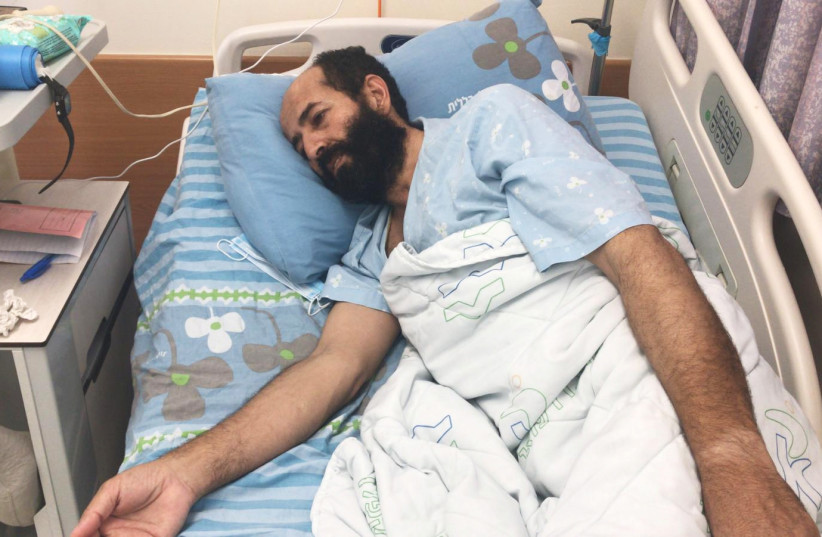Hunger strikers present a unique challenge for healthcare practitioners. As patients, they deny physicians the ability to carry out the job for which they are trained: providing medical treatment. Lacking awareness of the strike’s wider context, or worse yet, when there is animosity toward the striker, physicians will often blame the patients for their condition.
Consequently, medical staff may take decisions contrary to the welfare of the patient and even cross ethical and professional lines. This was made apparent most recently when the Shamir Medical Center attempted to release the hunger striker Khalil Awawdeh back into the hands of the Prisons Service (IPS), even though his life was clearly in danger.
To address these situations following the mass hunger strikes of 2012, the Health Ministry ordered the hospitalization of hunger strikers if their action lasts longer than 28 days (later changed to 40 days). The directive drew protest from the hospitals, mainly owing to the many cases and their placement in only a few hospitals.
The medical staff claimed that the hunger strikers’ presence was disrupting their work due to security measures and the constant visits by politicians and supporters. The objections eventually led to the removal of the regulation, and the decision of hospitalizing hunger strikers was left to the hospitals.
Such was also the case with Awawdeh, whose story should seemingly evoke strong empathy: a 40-year-old hunger striker, far too young to die and leave behind his wife and four daughters. And yet, for most Israelis Awawdeh is first and foremost a Palestinian detainee. From an Israeli perspective, this means he is seen as a threat, even after losing half his body weight and suffering from severe neurological symptoms and cognitive impairment.

As such, rather than fostering a trusting doctor-patient relationship that would reduce harm and ensure his rights are maintained, the hospital allowed Awawdeh to be cuffed to his bed and even threatened to return him to the IPS. It was only after pressure was applied by Physicians for Human Rights Israel that Awawdeh stayed in the hospital.
This position not only violates the World Medical Association Declaration of Malta on Hunger Strikers, but also counters all medical reason. There is a clear consensus, including on the part of the State Attorney’s Office, that all hunger strikers eventually face a high risk of death, and that Awawdeh has already reached this point. Medical data on hunger strikers from around the globe indicate that potentially lethal events such as heart arrhythmia may suddenly occur.
In such cases, treatment must be immediate and carried out in a properly equipped hospital. It is also widely agreed that the IPS lacks the professional know-how and means to treat patients in Awawdeh’s condition. This was further confirmed by the director of the IPS medical center in his court testimony and his decision to refer Awawdeh to the hospital.
Actions, or lack thereof, have consequences
WHEREAS ELDERLY persons are discharged only after ensuring they have a safe home to return to, Awawdeh’s physicians saw little relevance in the conditions of the IPS medical center. The hospital staff instead claimed that they have nothing left to do if Awawdeh continues to refuse medical care.
This attitude is symptomatic of the Israeli medical community’s deeply rooted refusal to account for the ways sociopolitical context informs patient treatment.
While administrative detentions may not fall within the scope of medical ethics, their consequences become medically relevant with every hunger strike. The circumstances of these detentions – unlimited custody without trial, isolation, harsh physical conditions, and repercussions for the family and community of the detainees – all pose ethical challenges for physicians.
Do these methods amount to humiliating punishment or torture? If so, what role do physicians play in protecting patients and preventing them from being returned to such circumstances? These questions highlight the core concerns of medical ethics.
Medical ethics are designed precisely for such extreme circumstances. Physicians rarely need to be reminded of their oath of ethics while treating children suffering from cancer. Medical ethics help doctors navigate complex realities at moments in which they do not necessarily empathize with their patients, and when societal and institutional pressure may urge them to neglect their duties.
But where medical ethics fail, clear procedures must bridge the gap. The ministry’s directive attempted to resolve a situation that should never have arisen. In accordance with binding international treaties, the physicians’ only concern should have been the critical condition of the hunger striker. What occurred instead was the exact opposite – the inherent reality of hostile Israeli-Palestinian relations overrode and nullified the ministry’s guidelines. In the absence of medical procedures and clear ethical lines, hunger strikers are left to rely on the pressure of external actors.
Ongoing systemic hostility may require a return to rigid procedures, rather than individual case assessment. For now, it seems futile to hope for a reality in which medical ethics are so well-integrated that they can overcome the structural hostility toward certain patients.
The writer is vice president for content and ethics at Physicians for Human Rights-Israel.
